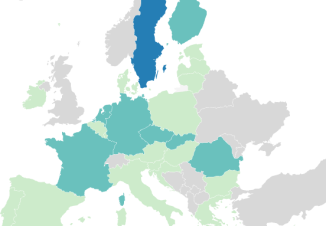
The European Court of Justice concluded the method used in Spain to calculate unemployment benefit for certain part time workers was indirectly discriminatory, when it decided on a three-pronged question raised by Social Court number 33 of Barcelona on 9 November 2017 (Case C-98/15).
Mrs Espadas Recio worked as a part-time cleaner continuously from 1999 to 2013, when her employment was terminated. She had worked on certain days of the week (a ‘vertical’ structure), in particular, on Mondays, Wednesdays and Thursdays, instead of distributing her working hours over the course of a five-day week (a ‘horizontal’ structure). Initially, the Spanish Public Employment Service (SPEE) granted her 120 days’ unemployment benefit. She complained and the SPEE partially upheld the claim, allowing her 420 days of benefit.
Dissatisfied with that, she claimed entitlement to the maximum period of 720 days, as she had been working continuously over the past six years and contributed to the social security system fully, as if she had worked every day of the week (for a total of 2,160 days) – far more than the 1,387 days recognized by the SPEE. The SPEE had calculated based on the three days a week she had actually worked, rather than those for which she had contributed.
After the trial in Barcelona, when the judge found that between 70% and 80% of vertical part-time workers are women, he observed that the method of calculation, which was based on Article 210 of the General Law of Social Security and of Article 3.4 of Royal Decree 625/1985 on Unemployment Protection, was potentially discriminatory. This method requires calculation to be made based on days worked, but in the judge’s view, this penalised part-time vertical workers in a double sense compared with horizontal workers, since both the amount of the benefit and its duration would end up lower.
He therefore referred a question to the ECJ. The ECJ considered both Article 4.1 of Directive 79/7 on equal treatment and indirect discrimination under national law. Indirect discrimination occurs when a seemingly neutral rule has a negative effect on part of the working population (in this case women). The question here was whether not taking into account days not worked but nevertheless contributed to for the purpose of calculating unemployment benefit period was indirectly discriminatory against women. The ECJ found that it was.
The Spanish Congress of Deputies has already considered this ruling and most of the parliamentary groups have signed an initiative in favour of amending the law so that benefit calculations can be made based on time contributed to, rather than days of the week worked.
This is a significant step towards labour equality between men and women. It is usually women who perform these kinds of low-paid jobs, often as a result of inequality of opportunities in the first place. It is a step in the right direction that this inequity should later be redressed at least to some extent by fair benefit treatment.


